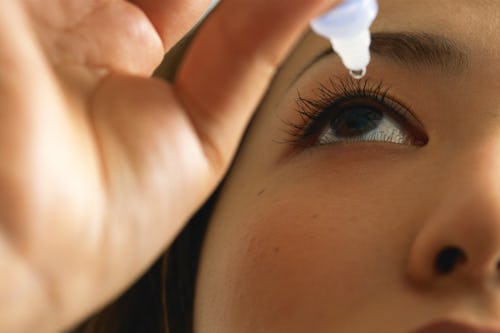
I think I probably need glasses, but I’ve been avoiding going to an ophthalmologist for, oh, about a decade. When I was a kid, I thought glasses were grown up cool. Now that I’m an actual grown up, the last thing I need in my life is another thing to carry. But apparently, these cyborgian new eye drops could potentially replace your glasses, so maybe I don’t even need to worry about it.
Maybe. “For anybody who doesn’t want to fiddle with reading glasses, this might be a really helpful alternative,” Scott MacRae, an ophthalmologist at the University of Rochester’s Center for Visual Science, told the Times. Oh, that’s definitely me.
Using eye drops to enhance your vision sounds pretty futuristic, but the science here isn’t actually new. The developers of Vuity are actually repurposing one of the oldest ophthalmic drugs, pilocarpine, which is used to treat presbyopia, a condition that makes it difficult for people to see things at a close range.
Presbyopia is actually quite common. You know when you see someone hold a book further away to read it? That’s generally presbyopia, and about 90% of adults over the age of 45 have it and it tends to get worse as we age, according to the Times. Vuity helps the condition by making the pupils smaller. Smaller pupils mean that less peripheral light — which can make it harder for the eye to focus — gets in.
Pilocarpine, the generic name for Vuity, has also been used for decades to treat glaucoma. Pharmaceutical company Allergan has been conducting clinical trials of Vuity, and told participants at the American Society of Cataract and Refractive Surgery in July that one drop of the drug in each eye can improve close-range vision for six hours and intermediate vision — like looking at a desktop computer — for up to 10 hours. The study results have not yet been subject to peer review, reported the Times.
The best thing about Vuity is that it does not impair distance vision like reading glasses do. “The drops don’t really affect distance vision under normal daylight conditions,” MacRae told the New York Times. But, Vuity can make it harder for people to see in the dark. And, according to the trials, some people who used Vuity reported headaches and other side effects. Basically, Vuity may not be a good option for everyone, and most people with presbyopia will probably still have to own reading glasses, but experts seem cautiously optimistic.
Look, I’m not saying this science isn’t cool, but personally, I can’t get over the ick factor. Why would I squeeze something into my eye that makes my pupils change shape and doesn’t give me any kind of buzz? Plus, Vuity is expensive at about $80 for a month’s supply. And well, squinting is free.







